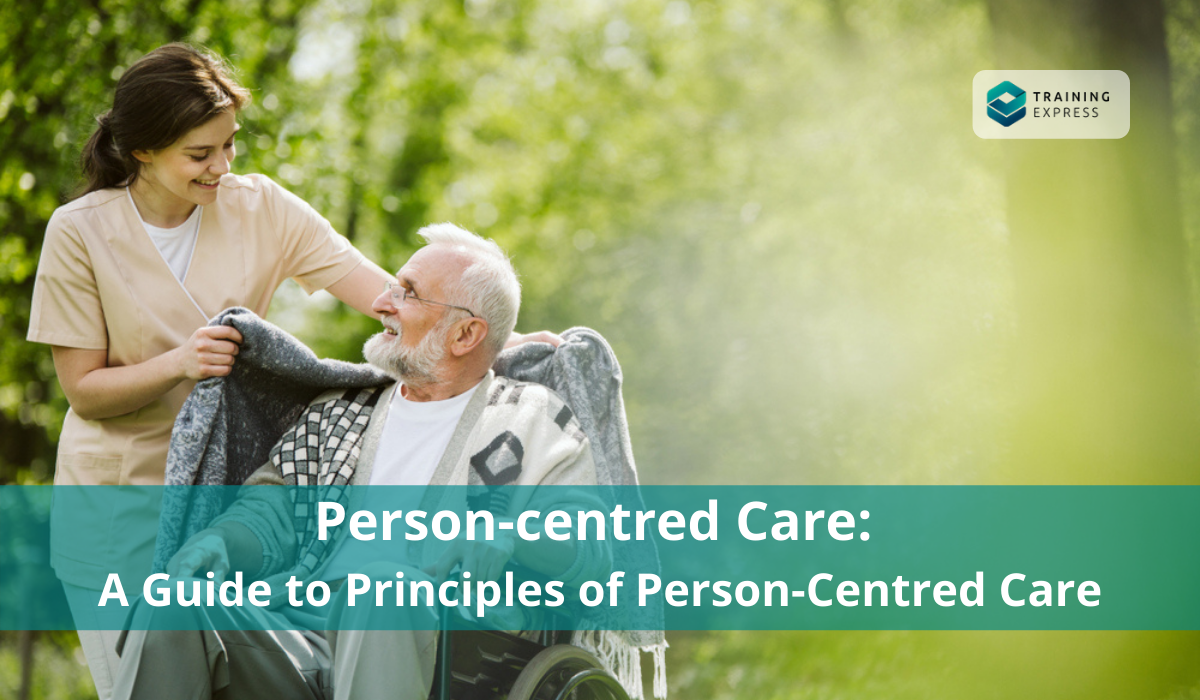
Person-centred care is the heart of health and care services. This approach is linked to successful healthcare results. Also, it is one of people’s healthcare rights. Knowledge about person-centred care can ensure better care and protect people in need.
This guide to principles of person-centred care contains the following information. It will give you a complete understanding of person-centred care.
What is person-centred care in nursing?
To take better care of their patients, nurses need to listen carefully to their patients. Getting to know a patient as a person is essential in person-centred nursing care. This helps to put their needs first, and it shows empathy towards people. In this care approach, nursing focuses on the individual’s wants and needs.
Most importantly, you should avoid the following in nursing:
- Total focus on task completion.
- Having a paternalistic approach of ’nurse knows best’.
To learn more about person-centred care in nursing, take this course in Adult Nursing & Social Care Training. This will give you comprehensive knowledge of adult care and help you become an expert in the field.
Why is person-centred care important?
The following are the reasons why person-centred care is a high priority rather than just a nice option –
1. Improved clinical outcomes
According to The Health Foundation, assisting patients with long-term conditions to manage their healthcare can improve clinical outcomes. Moreover, patients are less likely to use emergency hospital services. Also, they tend to stick to their treatment plans and take their medicine correctly. Hence, patients see improved health and care outcomes.
2. More satisfied patients
Person-centred care has more potential to meet a patient’s emotional and social needs. As a result, they maintain a high quality of life. Also, people are more satisfied with their care. Meanwhile, they can choose treatments based on their values and preferences. In fact, they are also more likely to stick to their treatment plans if they feel involved and in control.
3. Patients take more responsibility for their own health and care
The Health Foundation found that supporting self-management really works. Helping people to take care of themselves can improve their motivation. As a result, they will eat well, exercise and take medications. Person-centred care improves patients’ understanding and knowledge of their condition. They also realise when there’s a need for emergency services. Thus, they are less likely to utilise emergency services or choose costly treatments.
4. Less pressure on healthcare services
Research has found that person-centred care can improve people’s healthcare. It also reduces the burden on health services. Because people take better care of themselves and stick to their treatment plan. These relieve the pressure on nurses and the burden on healthcare services. For example, repeated checks and wasted medication saves time and effort. Moreover, as patient engagement increases, staff performance and morale also increases.
Overall, person-centred care helps patients receive more appropriate health care. They also feel cared for as human beings. The UK government has included it in several acts for successful enforcement. The following acts ensure person-centred care in practice.
1. Health and Social Care Act 2012
It requires Clinical Commissioning Groups to raise every patient’s involvement in their care.
2. The Care Act 2014
This act ensures the local authority’s involvement with adults. They are included in the assessment, care and support planning and review to protect them.
3. Care Quality Commission: Health and Social Care Act 2008; Regulations 2014
Regulation 9 intends to ensure that each person receives proper care and treatment.
What are the four principles of person-centred care?
The four principles of person-centred care are –
- Treat people with respect, dignity and compassion
- Provide coordinated care, support, and treatment
- Offer personalised care, support, and treatment
- Enable people to recognise and develop their strengths and abilities for an independent and fulfilling life
1. Treat people with respect, dignity and compassion.

Patients often feel like they lose their independence after they enter care. This also puts their dignity at risk. But person-centred care enables them to maintain their dignity by respecting their wishes. Also, in this type of care, nurses treat patients with sympathy.
To fulfil this principle, it is crucial to keep in mind that patients have their own –
‘feelings, opinions and beliefs.’
And these should not become invalidated by their care needs. Also, respecting their attributes helps the patient feel validated. It makes them feel cared for both physically and emotionally.
2. Provide coordinated care, support, and treatment

Some issues arise when patients move between services or carers. Because care providers have to rebuild an understanding of their wants and needs. In the meantime, the patient may not receive the level of care they need. That is why care providers should record patients’ personal needs. They can record it in their care plan and share it with other caregivers and services when needed.
Furthermore, all caregivers should interact with each other openly. It will help them to understand how to deliver care to their patients. However, this should be done by maintaining privacy at all times.
3. Offer personalised care, support, and treatment
Personalised care, support and treatment is the heart of person-centred care. It also calls for understanding – what works for one person may not be suitable for another. So a standard approach may have a negative effect. In fact, it can affect their ability to recover and manage their condition correctly. Moreover, depending on their situations or values, it may hamper their quality of life.
Personalising services for each patient allows them to retain some of their freedom. It can also fulfil their personal wants and needs.
4. Enable people to recognise and develop their strengths and abilities for an independent and fulfilling life

Person-centred care focuses on enabling people. In person-centred care, patients must be involved in decision-making. Also, carers should help them so that they can take actions to support themselves. Doing so allows them to build up their own abilities. It helps them understand how to look after themselves on their own.
Fulfilling this principle is helpful for both patient and healthcare providers. The patient will have greater control in their life. They can be less dependent on healthcare services. On the other hand, caregivers will have more time to care for other patients who are more dependent.
Even so, there should be a delicate balance. Letting them do more on their own might make them feel like they are being forced to do it. They might not see it as empowering or independent. But, too much engagement might make them feel like they have no say. Maintaining an open communication strategy can be helpful. It should be with the patient and their carers.
How to implement person-centred care?
- Knowing the patient as an individual. (Rather than treating them just as a patient).
- Actively involve them in care-related decisions.
- Providing responsive and personalised care.
- Respecting the individual’s values, preferences and wishes.
- Promoting a trusting caregiving relationship.
- Emphasising freedom of choice.
- Promoting physical and emotional wellbeing and comfort.
- Involving the person’s family and friends when appropriate.
- Treating the patient in their own home if they feel more comfortable.
- Providing tools and devices so that the patient can carry out everyday tasks independently. Such as a seat in the shower or a device that aids in putting shoes on.
Delivering person-centred care requires caring for patients beyond their condition. It involves tailoring services to suit their wants and needs. It’s about respecting their values and priorities in life and that they know what’s best for them. No one likes having decisions made for them without their input. It might make them feel like an object or a task, rather than a human being with thoughts and feelings.
Implementing person-centred care in everyday activities
To implement person-centred care, nurses can incorporate person-centred practices in their everyday interactions.
- Become familiar with the patient and their relatives.
- Explain what your role is in the care of the patient.
- Ask the patient how they are feeling – both physically and emotionally.
- Think of the patient as a person who has a life outside the hospital.
- Treat the patient as a partner throughout the whole process.
- Listen to the patient and respect their opinion and views about their own health.
- Listen to the patient’s family and carers.
- Recognise that being in a hospital can be a frightening and uncertain time for patients and their families.
- Acknowledge that feeling lonely or isolated in a hospital can be a shared experience.
- Give the patient all the necessary information to make informed decisions.
What are the benefits of person-centred care?
- Patients are motivated to adopt positive health behaviours. Especially that helps them manage their own health and better care of themselves. It is vital for people with long-term conditions who rely on healthcare services a lot.
- Person-centred care increases the healthcare team’s morale and ability to deliver care. Everyone will feel more positive about their role.
- It is time and cost-efficient. Personalised care ensures patients receive the medication they will actually take. This way is more efficient for both patient and healthcare services.
- Person-centred care helps to find suitable ways to increase their quality of care. This type of care enables supporting those who may not express their needs. Personalised care ensures their needs are met.
Closing note
Read more on our blog
- Why You Should Pursue a Cybersecurity Career
- The Early Years Foundation Stage (EYFS)
- Sports First Aid | Everything You Need To Know
- Lots of Likes on Instagram: How You Can Quickly Increase Popularity
- Why You Should Use Photo Background Removers For Mobile Devices
- Maximizing ROI: 11 Strategies For Efficient Advertising Spend
- How to Keep Your Data Safe While Applying for Jobs: 6 Tips
- Take Mac Classes to Transform Your Design Profession
- Exploring the landscape of e-commerce hosting
- Personal Branding For Executives: 7 Tips For Maximum Impact
- Available Courses
- Career Bundles73
- Animal care5
- Law8
- Quality Licence Scheme Endorsed111
- Teaching13
- Teaching & Academics Primary27
- Accounting & Finance Primary30
- Training3
- Design14
- IT & Software120
- Healthcare126
- Marketing31
- Health and Safety403
- Construction48
- Electronics25
- Hospitality22
- Health and Social Care219
- Child Psychology37
- Management377
- Business Skills268
- First Aid70
- Employability264
- Safeguarding75
- Food Hygiene103
- Personal Development1345
 Food Hygiene
Food Hygiene Health & Safety
Health & Safety Safeguarding
Safeguarding First Aid
First Aid Business Skills
Business Skills Personal Development
Personal Development







